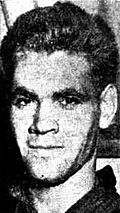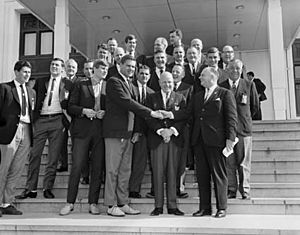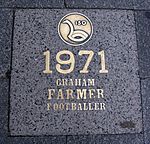Polly Farmer facts for kids
Quick facts for kids Polly FarmerMBE |
|||
|---|---|---|---|

Farmer in 1954
|
|||
| Personal information | |||
| Full name | Graham Vivian Farmer | ||
| Nickname(s) | Polly | ||
| Date of birth | 10 March 1935 | ||
| Place of birth | North Fremantle, Western Australia, Australia | ||
| Date of death | 14 August 2019 (aged 84) | ||
| Place of death | Perth, Western Australia | ||
| Original team | Maddington (SSFA) | ||
| Position(s) | Ruckman | ||
| Career highlights | |||
|
Club
Representative
Overall
|
|||
Graham Vivian "Polly" Farmer (born March 10, 1935 – died August 14, 2019) was a famous Australian rules football player. He played for the Geelong Football Club in the Victorian Football League (VFL). He also played for the East Perth Football Club and West Perth Football Club in the Western Australian National Football League (WANFL).
Polly Farmer was born in Western Australia. His mother was from the Noongar people, an Indigenous Australian group. Many people think he was one of the greatest footballers ever. When the Australian Football Hall of Fame started in 1996, Farmer was one of the first 12 players to be called a 'legend'. He is especially known for changing how players did 'ruckwork' and 'handballing' in the game.
After he stopped playing, Farmer became the first Indigenous coach in the VFL for Geelong. He also coached Western Australia's first 'State of Origin' team. The Graham Farmer Freeway in his hometown of Perth is named after him.
Contents
Early Life and Nickname
Polly Farmer was born in North Fremantle, Western Australia. His mother, Eva, was 25 and from Katanning, Western Australia. His father is not known. At the time, Australia was recovering from the Great Depression. In 1936, Farmer was placed in Sister Kate's orphanage. This home was for children of mixed heritage. Farmer never knew why he was put there. People believe his mother could not care for him.
Farmer was thankful for his time at Sister Kate's. He said it gave him a chance to have a normal life. He got sick with poliomyelitis, which made one of his legs shorter. When he was six, he was nicknamed "Polly the Parrot." People thought he talked a lot, like a parrot. Later, talent scouts from the East Perth Football Club noticed him. He then joined their team.
Polly Farmer's Football Career
Playing for East Perth
Farmer started his top-level career in 1953. He played for the East Perth Football Club in the West Australian Football League (WAFL). He played 176 games for East Perth until 1961. During this time, he won the club's best player award seven times. He also helped them win championships in 1956, 1958, and 1959.
In 1956, he won a Simpson Medal for his great game against South Australia. He also won the Tassie Medal as the best player at the carnival. He received the WANFL's top award, the Sandover Medal, in 1956 and 1960. He also tied for the medal in 1957 but won it later in 1997. In 1959, he won another Simpson Medal for being the best player in the grand final. He won one more Simpson Medal in 1961 for his game against Victoria.
Playing for Geelong
Farmer really wanted to play football in Victoria. Many clubs there were interested in him. In 1955, the Richmond Football Club tried to sign him. But East Perth stopped the move, so he stayed in Perth. Later, Bob Davis helped him join the Geelong Football Club in 1962. In his first game for Geelong, Farmer badly hurt his knee. He missed the rest of that season.
He came back in 1963 and helped Geelong win a championship. He also came in second for the Brownlow Medal. Farmer played 101 games for Geelong from 1962 to 1968. He won the team's best player award in 1963 and 1964. He was also the team captain from 1965 to 1967.
Farmer practiced handballing by throwing the ball through car windows. He changed handballing from a last-resort move to a powerful attacking skill. Geelong player Sam Newman said Farmer taught him everything without saying a word. He called Farmer an "absolute star" who was "one century ahead of his time."
Playing for West Perth
In 1968, Farmer wanted to go back home to Western Australia. He became the captain and coach for the West Perth Football Club. This club was a rival to his old team, East Perth. He led West Perth to win championships in 1969 and 1971. Both times, they beat East Perth in the grand final. In 1969, Farmer won his fourth Simpson Medal. He also played his 300th career game that season.
In 1971, he played his 346th career game. This broke the record for the most games played in elite Australian rules football. He also became the first player to play 350 career games. Farmer retired after the Grand Final in 1971, when he was 36 years old. He had played 79 games with West Perth, making his career total 356 games.
Coaching Career
After not playing in 1972, Farmer returned to the VFL as coach for the Geelong Football Club in 1973. His time as Geelong coach was not as successful as his playing career. Their best finish was sixth place in 1974. Farmer expected his players to train and prepare just as hard as he did. He found it hard to coach players who were not as naturally talented as him.
Farmer and the club's leaders had problems, and he left in 1975. He returned to the WANFL and coached East Perth from 1976 to 1977. He also coached the first Western Australian state of origin team in 1977. Farmer was let go as coach of East Perth in 1977.
Personal Life and Passing
In 1956, Farmer met Marlene Gray. They got married in 1957 and had three children: Brett, Dean, and Kim. In the 1960s, he was asked to join politics but said no.
Later in life, Farmer and his wife ran a motel. The business did not do well, and they lost their money. Friends and former teammates organized events to raise money for them. They raised $120,000, which helped them buy a small home.
In 1999, Farmer was diagnosed with Alzheimer's disease. His wife, Marlene, shared this publicly in 2012. He passed away on August 14, 2019, at age 84. He had a special public funeral at Perth Stadium. His wife Marlene had passed away in 2015.
After his death, Farmer's brain was studied. Researchers found signs of chronic traumatic encephalopathy (CTE). This is a brain condition sometimes found in athletes who have had many head injuries. Farmer was the first former VFL/AFL player to be diagnosed with CTE.
Polly Farmer's Legacy
In 1971, Farmer became the first Australian footballer to receive a special honor from the Queen. He was named a Member of the Order of the British Empire (MBE). His name is also on one of 150 bronze tablets in Perth, honoring important people in Western Australia's history. He was added to the Sport Australia Hall of Fame in 1985.
In 1994, Steve Hawke, an author, met Farmer. Farmer asked Hawke to help create the Polly Farmer Foundation. This group helps Indigenous children with their sports and school goals. Farmer wanted the foundation to help young Aboriginal people succeed. He wanted them to become leaders in many fields, not just sports.
In 1997, a new freeway in Perth was named the Graham Farmer Freeway. It connects West Perth and East Perth, the two areas where Farmer played football.
Polly Farmer was inducted into the first Australian Football Hall of Fame in 1996 as one of the twelve "Legends." He was also added to the West Australian Football Hall of Fame in 2004. He has been named the top ruckman in every "Team of the Century" for the leagues and clubs he played for. This includes the Indigenous Team of the Century, where he was captain. In 2008, he was ranked number 5 among the greatest football players of all time.
Farmer is also shown in a famous painting called The Game That Made Australia. This painting celebrates 150 years of Australian rules football.
When Farmer passed away, many people shared their memories and tributes to him.
See also
- 1963 Miracle Match
 | Leon Lynch |
 | Milton P. Webster |
 | Ferdinand Smith |



